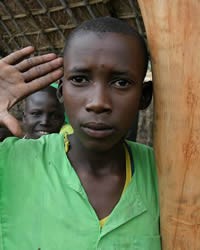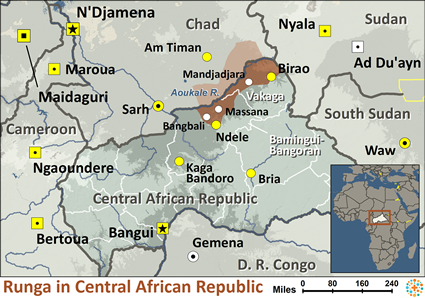The Runga of the Central African Republic are one of the Sudanic people groups who live primarily in Chad. Most of the Runga in Chad are located in the southern part of the country, along the border with the Central African Republic. Very little is known about the Runga in particular; thus, there are assumptions about their lifestyle and culture based on groups either related to them or living nearby.
The region where the Runga live was once the final stop for four major Saharan caravan routes. As a result, the region was ruled by a number of strong states with complex cultures and elaborate political systems. An early agricultural civilization grew up around the headwaters of the Niger River and gradually spread eastward across the entire breadth of the Sudan to the Nile Valley. However, as it spread northward to the edge of the Sahara Desert, the agricultural lifestyle was not adopted by the inhabitants who continued to live a nomadic life of hunting and gathering. Only as different varieties of crops were introduced by their northern neighbors did the tribes, such as the Runga, begin to adopt agriculture.
Today, the Runga are primarily farmers, using hoe cultivation and irrigation techniques. Millet and wheat are their main crops, but onions, garlic, and melons are also cultivated. Livestock production is another important activity for the Runga. Horses, cattle, goats, sheep, and chickens are raised for milk, butter, wool, eggs, meat, sacrifice and trade. Both men and women participate in the field work, but men alone do the clearing of the land and other heavy work. Men also tend to the animals, trade at local markets, and make family decisions. The women milk the animals, brew a millet beer and prepare a daily millet-based porridge. They are also responsible for domestic duties, such as caring for the children.
Although some Runga live in large towns in clustered huts, many live in compact rural villages. The huts in the villages are grouped in compounds surrounded by grass mat fences. The houses are usually round, with cone-shaped, thatched roofs.
Runga marriages occur when the men are in their twenties and the women are in their late teens. Polygyny (having more than one wife) prevails but is restricted to the Muslim limit of four wives. When a couple marries, they live with the bride's family for two years then move into their own newly built house. Subsequent wives live in their own huts, but the first wife is "chief" over them.
There have also been a couple of famous Runga warlords and even a prime minister from that group.
Most of the Runga accepted Islam around the seventeenth century. Today, the majority of the Runga in the Central African Republic are Sunni Muslims, with the rest practicing animism (belief than objects and forces in nature have spirits).
According to Islam, Allah is viewed as the sole creator and restorer of the world. Muslims teach that man's purpose is to submit to the will of Allah as revealed through the Koran, their holy book. They believe that Allah revealed the messages of the Koran to the prophet Mohammed.
Mysticism plays a large role in Sufi Muslim life. Sufi Muslims seek the truth of divine life and knowledge through a personal experience with Allah. This is achieved by repentance, meditation, spiritual changes, and ritual prayers.
Muslims are expected to follow certain moral standards. For example, marriages are strongly encouraged; children are to treat their mothers with tenderness; and chastity in women is of prime importance.
The Runga have no Christian resources in their own language available to them. There is a great need for Christian broadcasts to be made available to them. Prayer, however, is the first step to seeing the barriers of resistance broken down.
Pray for a record-breaking grain harvest for the Runga people that will be a testimony of God's power and grace.
Pray for the Lord to give Runga elders a spiritual hunger that will lead them to the empty grave.
Pray for a family-based movement to Christ among the Runga people.
Scripture Prayers for the Runga in Central African Republic.
https://en.wikipedia.org/wiki/Runga_people
https://brill.com/view/journals/iafr/12/2/article-p186_002.xml
| Profile Source: Joshua Project |

























